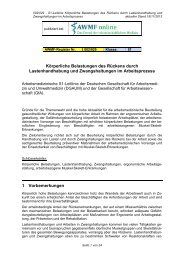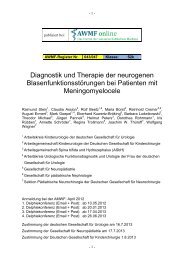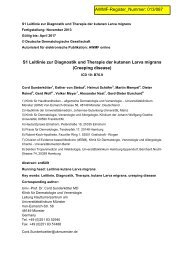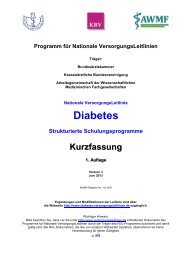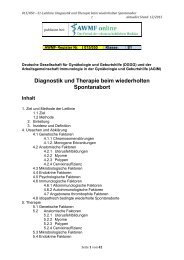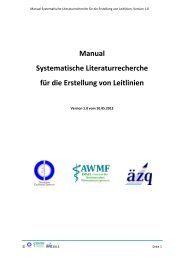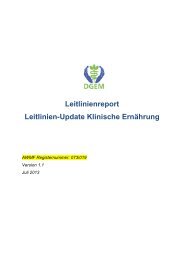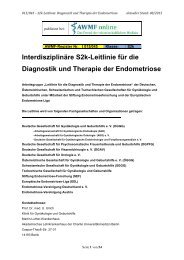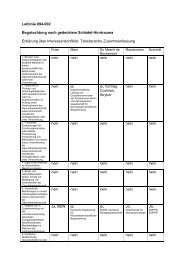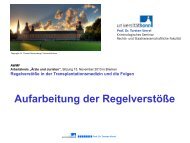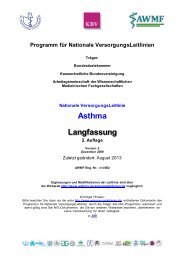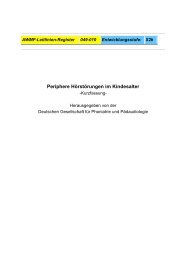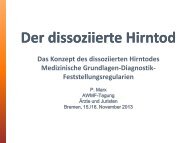S3-Leitlinie Demenzen (Kurzversion) - AWMF
S3-Leitlinie Demenzen (Kurzversion) - AWMF
S3-Leitlinie Demenzen (Kurzversion) - AWMF
Sie wollen auch ein ePaper? Erhöhen Sie die Reichweite Ihrer Titel.
YUMPU macht aus Druck-PDFs automatisch weboptimierte ePaper, die Google liebt.
50<br />
Literatur<br />
Literaturverzeichnis<br />
1. WHO, Dilling H, Mombour W, et al.: Internationale Klassifikation psychischer Störungen. ICD-10 Kapitel<br />
V (F), Klinisch-diagnostische <strong>Leitlinie</strong>n. 6. Aufl. Bern, Huber 2008.<br />
2. McKhann G, Drachman D, Folstein M, et al.: Clinical diagnosis of Alzheimer's disease: report of the<br />
NINCDS-ADRDA Work Group under the auspices of Department of Health and Human Services Task<br />
Force on Alzheimer's Disease. Neurology 1984; 34: 939-944.<br />
3. Roman GC, Tatemichi TK, Erkinjuntti T, et al.: Vascular dementia: diagnostic criteria for research studies.<br />
Report of the NINDS-AIREN International Workshop. Neurology 1993; 43: 250-260.<br />
4. Neary D, Snowden JS, Gustafson L, et al.: Frontotemporal lobar degeneration: a consensus on clinical<br />
diagnostic criteria. Neurology 1998; 51: 1546-1554.<br />
5. Goetz CG, Emre M, Dubois B: Parkinson's disease dementia: definitions, guidelines, and research<br />
perspectives in diagnosis. Ann Neurol 2008; 64, Suppl 2: S81-92.<br />
6. McKeith IG, Dickson DW, Lowe J, et al.: Diagnosis and management of dementia with Lewy bodies: third<br />
report of the DLB Consortium. Neurology 2005; 65: 1863-1872.<br />
7. Dawson JD, Anderson SW, Uc EY, et al.: Predictors of driving safety in early Alzheimer disease. Neurology<br />
2009; 72: 521-527.<br />
8. Lukas A, Nikolaus T: Fahreignung bei Demenz. Z Gerontol Geriatr 2009; 42: 205-211.<br />
9. Carriere I, Fourrier-Reglat A, Dartigues JF, et al.: Drugs with anticholinergic properties, cognitive decline,<br />
and dementia in an elderly general population: the 3-city study. Arch Intern Med 2009; 169:1317-1324.<br />
10. Mitchell AJ: A meta-analysis of the accuracy of the mini-mental state examination in the detection of<br />
dementia and mild cognitive impairment. J Psychiatr Res 2009; 43: 411-431.<br />
11. Kalbe E, Kessler J, Calabrese P, et al.: DemTect: a new, sensitive cognitive screening test to support the<br />
diagnosis of mild cognitive impairment and early dementia. Int J Geriatr Psychiatr 2004; 19:136-143.<br />
12. Ihl R, Grass-Kapanke B, Lahrem P, et al.: Entwicklung und Validierung eines Tests zur Früherkennung der<br />
Demenz mit Depressionsabgrenzung (TFDD)]. Fortschr Neurol Psychiatr 2000; 68: 413-422.<br />
13. Cullen B, O'Neill B, Evans JJ, et al.: A review of screening tests for cognitive impairment. J Neurol<br />
Neurosurg Psychiatr 2007; 78: 790-799.<br />
14. National Collaborating Centre for Mental Health (commissioned by the Social Care Institute for Excellence<br />
and the National Institute for Health and Clinical Excellence): Dementia. A NICE-SCIE Guideline on<br />
supporting people with dementia and their carers in health and social care. National clinical practice<br />
guideline, number 42. London, The British Psychological Society and Gaskell 2007<br />
15. Institut für Qualität und Wirtschaftlichkeit im Gesundheitswesen (IQWiG) (Hrsg.): Cholinesterasehemmer<br />
bei Alzheimer Demenz. Abschlussbericht A05-19A (Version 1.0, Stand: 7.2.2007). Köln, IQWiG 2007.<br />
16. Morris JC, Heyman A, Mohs RC, et al.: The Consortium to Establish a Registry for Alzheimer's Disease<br />
(CERAD). Part I. Clinical and neuropsychological assessment of Alzheimer's disease. Neurology 1989; 39:<br />
1159-1165.<br />
17. Verhey FR, Houx P, Van Lang N, et al.: Cross-national comparison and validation of the Alzheimer's<br />
Disease Assessment Scale: results from the European Harmonization Project for Instruments in Dementia<br />
(EURO-HARPID). Int J Geriatr Psychiatry 2004; 19: 41-50.<br />
18. Bickel H, Mosch E, Forstl H: Screening of cognitive functions and the prediction of incident dementia by<br />
means of the SIDAM. Psychiatr Prax 2007; 34: 139-144.<br />
19. Schmitt FA, Ashford W, Ernesto C, et al.: The severe impairment battery: concurrent validity and the<br />
assessment of longitudinal change in Alzheimer's disease. The Alzheimer's Disease Cooperative Study.<br />
Alzheimer Dis Assoc Disord 1997; 11, Suppl 2: S51-56.<br />
20. Bondi MW, Jak AJ, Delano-Wood L, et al.: Neuropsychological contributions to the early identification of<br />
Alzheimer's disease. Neuropsychol Rev 2008; 18: 73-90.<br />
21. Gainotti G, Marra C: Some aspects of memory disorders clearly distinguish dementia of the Alzheimer's type<br />
from depressive pseudo-dementia. J Clin Exp Neuropsychol 1994; 16: 65-78.<br />
22. Hildebrandt H, Haldenwanger A, Eling P: False recognition helps to distinguish patients with Alzheimer's<br />
disease and amnestic MCI from patients with other kinds of dementia. Dement Geriatr Cogn Disord 2009;<br />
28: 159-167.<br />
23. Jacova C, Kertesz A, Blair M, et al.: Neuropsychological testing and assessment for dementia. Alzheimers<br />
Dement 2007; 3: 299-317.<br />
<strong>S3</strong>-<strong>Leitlinie</strong> "<strong>Demenzen</strong>": <strong>Kurzversion</strong> (November 2009)<br />
Die "<strong>Leitlinie</strong>n" der Wissenschaftlichen Medizinischen Fachgesellschaften sind systematisch entwickelte<br />
Hilfen für Ärzte zur Entscheidungsfindung in spezifischen Situationen. Sie beruhen auf aktuellen wissenschaftlichen<br />
Erkenntnissen und in der Praxis bewährten Verfahren und sorgen für mehr Sicherheit in der Medizin, sollten aber auch<br />
ökonomische Aspekte berücksichtigen. Die "<strong>Leitlinie</strong>n" sind für Ärzte rechtlich nicht bindend und haben daher weder<br />
haftungsbegründende noch haftungsbefreiende Wirkung.<br />
Die <strong>AWMF</strong> erfasst und publiziert die <strong>Leitlinie</strong>n der Fachgesellschaften mit größtmöglicher Sorgfalt - dennoch kann die<br />
<strong>AWMF</strong> für die Richtigkeit - insbesondere von Dosierungsangaben - keine Verantwortung übernehmen.



